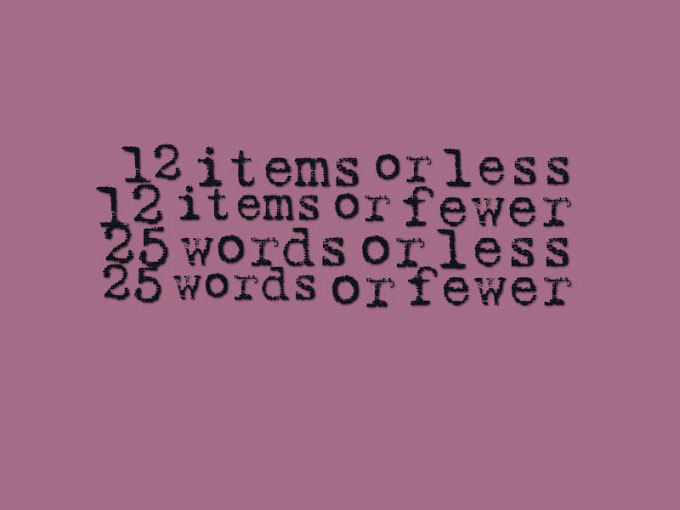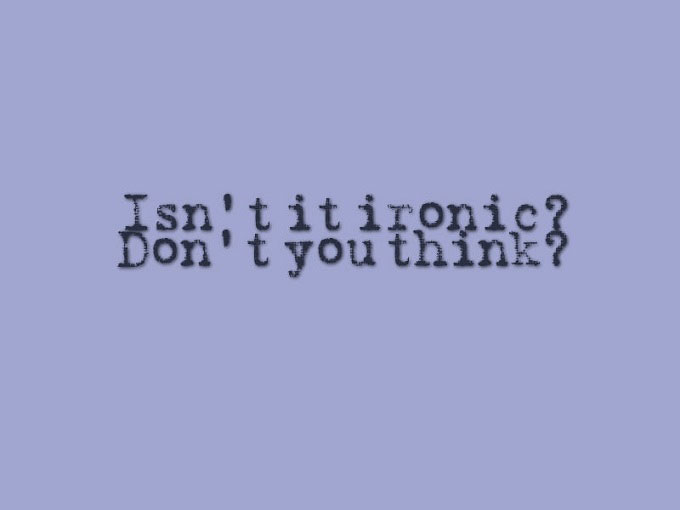I’m guessing I’ve lost a lot of readers just from the title of this post.
For those of you still reading, welcome to this third instalment of Practical Grammactical. We’ve blitzed through punctuation and discussed some one-word/two-word confusion.
And now I’m shaking things up by saying that right isn’t always right. Whaaaaaaat? Impossible!
Let’s kick it off with one you’ve seen on the blog before. Cue Mission: Impossible music.
Less or fewer?
Have you ever stood in the queue for the 12 items or less checkout at the supermarket and wanted to scream? IT’S FEWER, YOU ILLITERATE NUFF-NUFFS. FEWER!
It’s time to admit defeat on this one. If you’re standing in the queue with nine items in your basket, you’ve obviously understood the meaning. Communication mission accomplished.
And if you’re hosting a 25 words or less competition, stick with ‘less’. ‘Less’ is what people are familiar with. ‘Less’ is what people will plug into an online search engine.
If you use ‘fewer’ instead, you will get comments. Not the good kind. There will be no back pats, and the comments won’t be competition entries. Those that find your 25 words or fewer competition will feel compelled to point out that in their expert opinion, you should have used ‘less’ instead of ‘fewer’. Some will even despair at the state of the English language.
Save yourself the hassle (not to mention the temptation of entering into a linguistic debate with your readers). Stick with ‘less’. Just like I did when I shared my tips for winning 25 words or less competitions.
Isn’t it ironic?
No, not usually. These days, people use the terms ‘ironic’ and ‘ironical’ to describe events that are better described as coincidences, or even events that should in fact be expected from the given circumstances. This use doesn’t fit with the original dictionary definition.
But it’s been used in the Alanis Morisette ‘Isn’t it a coincidence? Don’t you think?’ way for so long now that the official dictionary definition has actually changed.
So yes, it is ironic. Even though it’s really just a coincidence. And when someone says that someone pulling the fire alarm bell five minutes before something actually caught on fire is ironic, you know what they mean. Communication mission accomplished.
Literally means literally. Except when it doesn’t.
Literally. I will literally die. For two reasons:
- You know what I mean. You know that I won’t literally stop breathing if you say I’m an idiot for using ‘literally’ to mean ‘figuratively’. Communication mission accomplished.
- The dictionary definition now reflects this. People have been using ‘literally’ for so long to exaggerate the meanings of ‘figuratively’ and ‘technically’ that these uses are now secondary definitions. This happens to lots of words. It happened to literally almost two years ago. It happened to misogyny before that. It’s time to move on.
‘If’ can be non-conditional.
This used to get to me. It still makes me feel a little squeamish. That ‘if’ sticks out. So if you’re not interested, this post will disappear? Um, nope. It’s still here.
But again, it’s a case of this sentence being acceptable because my point is clear. The non-conditional ‘if’ doesn’t hurt your understanding. You know what I mean. Communication mission accomplished.
The non-conditional ‘if’ stops you from overstating your authority. It softens a message, and makes it sound helpful instead of dictatorial. It gives you the option of taking the information on board if you’re interested, or ignoring it if you’re not.
In a former work life, I had a boss who used to begin every request with ‘if you could’. “If you could send a quote to the client.” “If you could finish that report by tomorrow.” There was no further element to the sentence. It was left dangling. It wasn’t used to mean that if ABC, then XYZ. If I could do that, then a reward would be evident or something would eventuate. No. It was just a softener so that she didn’t feel she was issuing direct commands. “Send a quote to the client.” “Finish that report by tomorrow.”
The grammatical pedant in me hated it, and in fact still hates it. (It’s going beyond the non-conditional if to a non-conditional if statement.) But when I look at the direct alternatives, I can see why she did it. I can even appreciate it. Communication mission accomplished.
—
There you go. Just a small selection of former grammatical no-nos that you’ll now see more often than their equivalent yes-yesses. End Mission: Impossible music. Cue Mission: Possible and Actually Occurring music.
Go forth and err.
Do you have any to add? Have you noticed any former (or current) grammatical grumbles now becoming accepted?
And who will be the first to vehemently disagree with one of these? The clock is ticking… or is that the start of the Mission: Impossible music again?




The fewer vs. less debate is one I resigned myself to some time ago. Sigh!
My theory is that people will start using ‘fewer’ in the ‘less’ way ironically, but they’ll do it so often that it will actually become the new normal. So not ironic at all. Ha.
Don’t you just love the English language?
YES YES YES I do!!
You have a great way of explaining these things Em! Hmmm…how about ‘versed’, as in ‘my team versed his team and my team won’. I hear this all the time from kids now. I suppose it’s a bit like text/texting/texted. We tend to play fast and loose with our verb agreements these days! Some of it is evolution of language…some of it is just plain wrong! 😉
I’m really enjoying watching ‘versed’ take hold. Really enjoying it. I think sometimes, instead of correcting kids, we should listen more and realise that some of their ‘new’ creations are quite intuitive.
Another handy installment. Thank you Em 🙂
You’re welcome!
English makes no sense most of the time.
HAHHAHAHHAHAHHA!! ^^^^^ THIS!!! Trying to teach my son to read is a daily reminder of how little sense the English language actually makes.
Oh, but it does! Even when it doesn’t. I promise.
Just goes to show how you get so used to hearing things that you don’t even think about what is actually being said. (And by ‘you’, I mean ‘me’… you clearly think about them a lot, you grammatical pedant, you!)
I do think about them a lot! But I get paid to do so, which makes it slightly more acceptable. Slightly.
Very interesting and informative! I love writing, but have to admit that in the past I would glaze over at the thought of grammar lessons. I had a lecturer at uni who was obsessed. We would make glaring errors just to mess with her head! I’m much more interested in grammar now, and have actually started reading some of my old textbooks recently…for fun!!
Oh dear. I didn’t realise grammatical errors could be weapons!
I literally love this post. 🙂 #TeamIBOT
Now I’m confused! Haha! I’m going to go with the original definition in my interpretation. #fistpump
Great post. The literally one really grates on me. It is misused so often!
BUT IS IT?!
Thank you for this lesson. I have to admit that my grammar needs a lot of work, in fact I don’t think we were even taught half of these things when I was at school but the one I don’t like is when people say pacifically instead of specifically!
Haha, that’s a funny one. It doesn’t bother me if people say it, because you can work it and I assume it’s a pronunciation thing. Seeing it written is squirm-inducing, though.
Laughed at Bec’s comment up there ^^^
Great post Em. I’ll admit that I hadn’t even noticed that if can be non-conditional, but now you mention it, I get it. It’s funny how we just get used to things being a certain way, and it’s not till you think about it, that you realise it’s wrong. Except that it’s not, because like you said, the point was communicated.
Non-conditional ‘if’ is one of those things that still irks me even though I know it shouldn’t. I keep it out of professional documents, but if I’m proofing something more personal or conversational, it just gets a highlight/comment to the author rather than a correction.
My husband has a real issue with things being advertised as “for free”. Free is not a cost!! It’s just free!
GOOD ONE!
I read these grammar posts holding my breath just in case I’ve been doing something wrong all these years! I’m studying Communications and I lost a mark recently for following a grammar rule too well so your post is timely.
Please don’t! Especially not for this post – it’s a post about how ‘wrong’ things aren’t that wrong. It’s meant to be reassuring. x
Thanks for this Em. I am ashamed to say I don’t know what this fewer vs less argument is about…The other stuff I’m getting. But here’s a question: what the hell is with the word ‘uncomfortability’? Why can’t people just say ‘discomfort’??
Haven’t come across uncomfortability. Thanks for sharing. That’s a strange one!
Fewer and less is best described with an example. Simple version: fewer is generally used for things you can count, less for things you can’t. So less rice, but fewer grains of rice. She spent less time on the assignment than her brother. He ate fewer biscuits while typing madly at the keyboard to complete it. She made fewer errors, and he got a less impressive mark.
Oh how I love you and your tips – and your great sense of humour, I hope you’re on the mend x
Thanks Em. Much better now. x
I take my hat off to any person learning English as a second language! I saw a cartoon last week that made me smile and think of you – one stick figure was pointing at another with a stern look on his face and saying “I do NOT use words I don’t majestically understand.” 🙂
It’s certainly difficult! And its world dominance doesn’t help.
Fascinating post! I love the English language. I have never thought of the less/fewer debate and I’m probably guilty of using literally and ironic wrong at times! The one that annoys me the most though is the use of ‘guttered’ in place of ‘gutted’. It is so common place now!
Oh really?! I haven’t seen it! And unlike some homophone-related errors/coinings, it doesn’t seem to have a reasonable explanation as a replacement.
Unless ‘I’m so sad I’m going to curl up in the gutter and cry’ works?!
Awesome. I have to tell you now I am probably the worst offender when it comes to grammar and typos!! (So please be kind to me.) My brain is a little dyslexic and I read back what I want to see. But I loved reading your post. Keep them coming – you’ll probably teach me a thing or two.
We all read back what we want to see (or expect to see) to some degree. No judgement from me. Ever. Thanks for your comment.
So good, Em. I hope you are going to tackle the whole ‘them’ thing. Them instead of he or she is driving me a bit batty ‘cos you enter into ‘themselves’ when you really only mean one person. What to do?! x
I am, I am! I’m really nervous about that one because there are two very strongly opposing views. Girding my loins to post mine. And judging by your comment, I think my view is going to drive you batty. x
I always get nervous reading these posts from you as I probably get them a wrong. I have taken notes, now just need to put them to memory
That’s the tough part! I’m finding it difficult to learn new things without losing something else first. 😉
I get annoyed when I hear people say “have a listen”. You can’t have a listen you can only listen!
Another interesting one! Writing all these suggestions and gripes down.
Love your tips – but your posts scare me. I’m afraid to know just how bad my grammar and punctuation actually is.
Thank you, and sorry. I’m going to focus on the love and keep writing them!
I feel smarter just for having read this post. Mission accomplished! Oh and that ironic/ironical thing bugs me big time but I love Alanis so I’m trying to forgive and forget. Besides, it’s hard to sing about coincidences. x
Yes, I don’t think the song would have been as popular if it had been called Coincidental!
So glad I have you in my life! I think I did one class in grammar when I was in year 3. That’s it! The rest, I am looking up on Dictionary.com as I write. Hopefully I mostly get it right!
Happy to be in your corner if and when you need me! x
I literally (haha) no really… shake with fear when my kids ask for help with their grammar homework. I suck at it I think, but thankfully your are here to keep us on the straight and Narrow Ms Em… do you tutor? No for real! I’ll pay you in cocktail onions and tea xx
I haven’t tutored for ten years but hey, why not?
I had this discussion with a client this week. His very gramamtically pedantic dad had been through some copy I edited for him and picked up some stuff I’d ‘missed’. I hadn’t missed it. It’s just that sometimes you have to go with what ‘sounds right/good’ to the ear … because what’s grammatically correct can sometimes sound very jarring/like dog’s balls
Yes indeed it does. Ending a sentence with a preposition is usually the best example. There are just certain conversations and communications in which you cannot have sentences that sound like this one.
“Literally” kills me – figuratively of course! My pet hate is some one saying rather unique or quite unique. Either it is unique or it is not!!! Deep breaths!
Breathe! Breathe! Breathe! Yes, absolutes aren’t so absolute these days. Unique is a great example. Thanks!
This is good! ALthough I’m probably guilty of some of these things. I’ve been told by family members I have horrible grammar on my blog. English is a second language to me and I’ve always thought about doing a short course to improve this weakness of mine. Now that you mention it I have noticed how the use of some words today has morphed their terminology.
No guilt! As long as the message gets across, you’re doing just fine. Unless it’s in a corporate brochure and you’re getting paid for it. Then my red pen will find you. x